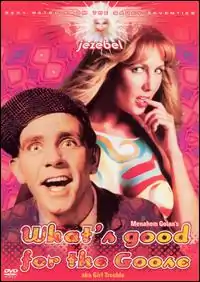What's Good for the Goose
What's Good For The Goose, also known as Girl Trouble, is a 1969 British comedy film directed by Menahem Golan and starring Norman Wisdom.[1][2]
| What's Good for the Goose | |
|---|---|
 | |
| Directed by | Menahem Golan |
| Produced by | Tony Tenser |
| Written by | Norman Wisdom Menahem Golan |
| Starring | Norman Wisdom Sally Geeson Terence Alexander David Lodge |
| Music by | Ken Howard |
| Cinematography | William Brayne |
| Edited by | Dennis Lanning |
| Distributed by | Tigon British Film Productions |
Release date | March 1969 (UK) |
Running time | 105 minutes (UK) 98 minutes (edited) |
| Country | United Kingdom |
| Language | English |
It was written and directed by Menahem Golan. The film features pop music by Electric Banana otherwise known as the Pretty Things. The film uses locations around the Southport area, including the Birkdale Palace Hotel.
Plot
Norman Wisdom plays a 50-something assistant bank manager called Timothy Bartlett whose working life and marriage in London have become lacklustre. On his way to a bankers' conference in Southport, he gives a lift to two fun-loving female students, and has a brief affair with one of them, Nikki (Sally Geeson). He abandons his work responsibilities to have a perfect day with her, taking in all the seaside amusements and recapturing his youthful energy. He tells her he has fallen in love with her and rents a 'love nest' for them, only to find out he was just a two-day novelty for her and she has already moved on to someone her own age. So he invites his wife to join him at the resort and takes her to the places Nikki uses, apparently to show her he's fine without her. They replicate the perfect day he had with Nikki, finding he can have (almost) as much enjoyment with his wife.
Cast
- Norman Wisdom as Timothy Bartlett
- Sally Geeson as Nikki
- Sarah Atkinson as Meg
- Sally Bazely as Margaret Bartlett
- Stuart Nichol as Bank Manager
- Derek Francis as Harrington
- Terence Alexander as Frisby
- Paul Whitsun-Jones as Clark
- David Lodge as Porter
- Karl Lanchbury as Pete
- Hilary Pritchard as Cashier in Discotheque
Production
There was also a German dubbed version of the film which bears the title Öfter mal was Junges!! This version is 27 minutes shorter than the UK version running to 75 minutes instead of 102 minutes. It contains alternative longer versions of the hotel bedroom scenes in which Sally Geeson is topless rather than remaining in her bra as she does in the UK print (which is the generally available version). The text in the opening credits is completely redone in German over the same unfettered film sequence as in the UK version meaning it must have been prepared concurrently.
References
- John Hamilton, Beasts in the Cellar: The Exploitation Film Career of Tony Tenser, Fab Press, 2005 p 126-127
- Simon Sheridan, Keeping the British End Up: Four Decades of Saucy Cinema, Titan Books 2011 p 61-63